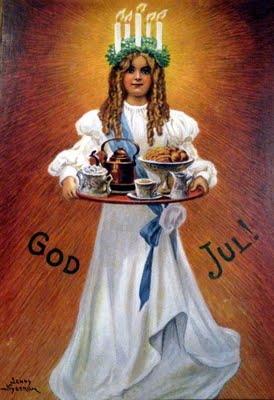I’m always impressed by the potential in Swedish to turn nouns into verbs.
Take the famous ‘fika’ for example. It describes a kind of food which is of dubious nutritional value but all-important as a symbol of social cohesion. It’s cake with coffee, in-between meals, and as part of a social occasion. And in Sweden it isn’t just cake and coffee, it’s also the process of eating the cake and drinking the coffee. To ‘fika’ is to spend time doing what you like best, and slowly. Using the same word as noun and verb means you don’t have to describe how you feel about a thing, in this case, cake with coffee; you become a part of it.
There was a new one for me this week: to ‘lussa’. Not a word I’d ever come across before. It accompanied lots of pictures in the newspaper of girls with candles in their hair. It’s the celebration of ‘Lucia’, or ‘St Lucia’, on 13th December – a mix of pagan and Christian myth and legend, on what used to be (in the old calendar) the longest night of the year. St Lucia – a girl dressed in white, with candles on her head – arrives in the morning darkness bringing saffron buns and wine or coffee. Almost every organisation celebrates it – every school, company, institution has its own ‘Lucia’. Even ’68 degrees bed and breakfast’ had one this year. And now I learn that what I did, when I dressed up and surprised the guests in a dark breakfast room, was to ‘lussa’.

You wonder what other nouns might work as verbs. It’s Christmas, so could anyone ‘christmassa’ do you think? What would that entail exactly? I suppose that’s the limitation. It needs to be clear what the thing is, and everyone has to agree what that is, before you can enact it as a verb. When I ‘christmassa’, I cook buckwheat roast and sing carols, but someone else might eat Christmas cake and watch repeats of ‘The Snowman’ on TV. No, it wouldn’t work, using it as a verb.
This week the local council has made a valiant attempt at stretching the use of the Swedish language to help us all feel things are moving along nicely. They say that children are ‘dancing’ the relocation of the town.
There we were, thinking that moving Kiruna was all about bringing in interested building companies and reliable financial backers, and the council showing the way with a well thought out town plan. But no, apparently the relocation can be ‘danced’.
Confused? So were we, so we turned to the relevant page of this month’s information brochure about the moving of the town. ‘How does one dance the moving of a town?’ the article asks.
How indeed. We read on.
The children are showing the way, it says, and they begin with ‘their own part in the process’. You can ‘dance’ your living room, or you can ‘dance’ your way to school. Then you can ‘dance’ the town’s architecture, what’s currently here, and ‘dance’ what you would like to have there in the future. Well who’d have thought it?
This could make town planning committees all over the country a lot fitter. And instead of us all sitting around waiting for something to happen in Kiruna, we can now all take our part in ‘dancing’ the new town into existence.
I’m for it, I need the exercise. But perhaps instead of ‘dancing’ the town to its new location, they ought just to say that this is how you ‘Kiruna’.

